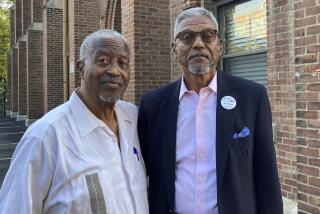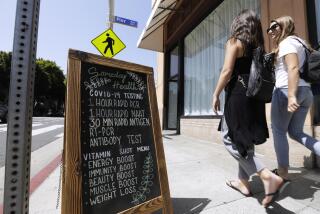U.S. Joins Suit Alleging Teledyne Falsified Tests : Government: The defense contractor is accused of selling faulty relays used in nearly all major weapons programs.
- Share via
Joining the nation’s biggest whistle-blower case, the Justice Department disclosed in Los Angeles on Wednesday that it will back a $250-million civil fraud suit against a Teledyne Inc. unit accused of falsifying test results and leaving key electronics systems in the nation’s most important weapons vulnerable to catastrophic failure.
The case charges that over the past decade Teledyne Relays, a division of the Los Angeles defense contractor, systematically falsified tests the company was required to perform to ensure the reliability of electromagnetic relays it supplied to the government for a wide array of projects.
The government and its contractors purchase more than 200,000 relays per month from Teledyne for use in virtually all major weapons and space programs, including guidance systems for the Patriot missile, the space shuttle and satellite launching devices.
Relay failures can cause any of these systems to operate improperly and cause catastrophic damage, according to the suit. It is unknown if any failures have been attributed to the devices.
The Justice Department’s decision to join the False Claims Act suit follows a 19-month investigation and indicates that the government believes it has been defrauded by Teledyne. The department’s decision was revealed when the case--originally filed under seal in U.S. District Court in Los Angeles in September, 1990--was unsealed Wednesday by U.S. District Judge David V. Kenyon.
Teledyne spokesman Berkeley Baker said the company would have no immediate comment on the suit.
However, Teledyne previously has acknowledged that the relays division’s Hawthorne plant was the subject of a massive October, 1990, raid by several government agencies, including the FBI, looking for evidence of false testing. The company also has acknowledged that Teledyne employees have been subpoenaed to testify before a federal grand jury in Los Angeles.
Federal sources said the grand jury probe is continuing and there could be indictments this summer.
The matter also is being investigated by the Subcommittee on Oversight and Investigations of the House Energy and Commerce Committee, chaired by Rep. John Dingell (D-Mich.), according to a subcommittee source.
The lawsuit charges that Teledyne’s relays routinely failed federally mandated reliability testing over the past decade, but that the company falsely reported to the government that its devices experienced no failures.
The case was filed under a provision of the False Claims Act that permits any person having knowledge of fraud against the government to file suit on behalf of the government and to share in the monetary recovery if the suit is successful. The two individual plaintiffs are Almon Muehlhausen II of Torrance, the test lab manager for Teledyne Relays, and Emil Stache of Alta Loma, former manager of quality engineering and reliability at the unit.
Last June, Stache filed a separate suit in Los Angeles County Superior Court, alleging that he was illegally fired in 1990 because he refused to falsify test results on relays used extensively by the U.S. military.
During his seven years at Teledyne, “Stache found numerous problems and improprieties with the testing program,” the False Claims suit alleges.
Despite numerous failures of its relays during internal testing, Teledyne has reported only one relay failure to the government since 1983, according to the suit. Military specifications require relay manufacturers to report all failures, according to the suit.
In an interview, the two plaintiffs said they decided to go to authorities after they discovered that Teledyne was intending to send a batch of faulty relays for classified work at the government’s Sandia National Laboratory in Albuquerque, N.M.
“I said to myself, ‘I can’t let this go on,’ ” Muehlhausen said.
Muehlhausen said he called Stache, knowing that he, too, was concerned about testing problems. “I said, ‘I’m going to the FBI’ and he said ‘I’m coming too,’ ” Muehlhausen recalled.
A source with Dingell’s subcommittee said the FBI seized a batch of 12 relays headed for Sandia and that nine of the 12 failed when tested.
Following the October, 1990, raid, the government’s Defense Electronic Supply Center (DESC) banned shipment of Teledyne relays through March, 1991, and again from May to August, 1991. The company also was required to issue an industrywide alert describing its testing problems. And in the past year, the firm acknowledges, it has modified some of its testing procedures and equipment.
The subcommittee source said Dingell is investigating why the government ban was lifted and then reimposed and whether DESC had adequately monitored the situation.
The False Claims suit unsealed Wednesday was originally filed by Hall & Phillips, a West Los Angeles firm that specializes in defense fraud cases.
Attorney John R. Phillips said the suit is unusual in that it is “one of the few defense fraud cases where damages are specifically calculable in a precise way.” Co-counsel Ann E. Carlson explained that the government “pays a huge premium for Teledyne relays above their commercial market price, because the relays are supposedly subject to a rigorous testing program designed to ensure their reliability.”
The damages awarded in the case--if it is successful--would be the difference between the price of the tested relays versus the untested ones and could total more than $250 million. However, the False Claims Act requires that actual damages be trebled, which means the penalties could exceed $1 billion.
More to Read
Inside the business of entertainment
The Wide Shot brings you news, analysis and insights on everything from streaming wars to production — and what it all means for the future.
You may occasionally receive promotional content from the Los Angeles Times.










